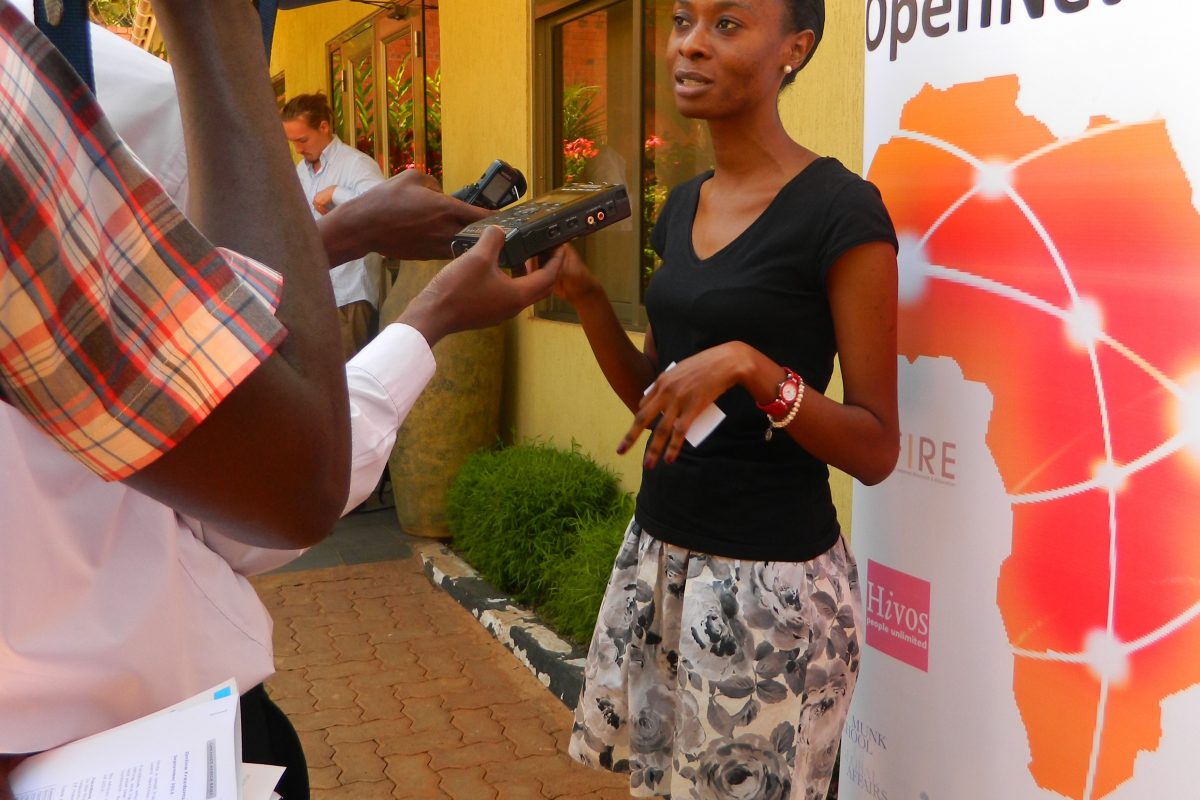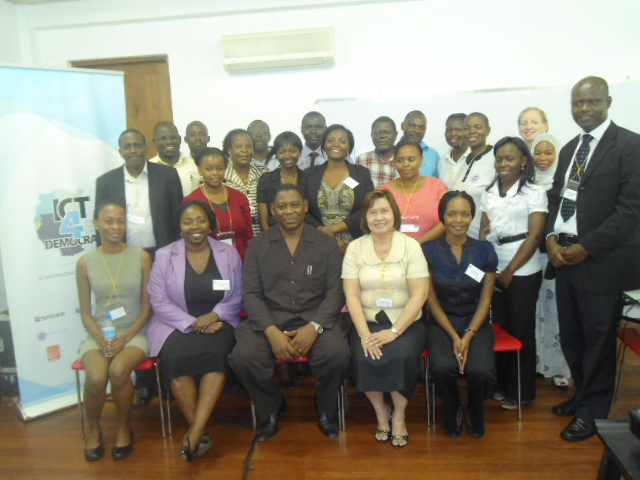The Collaboration on International ICT Policy in East and Southern Africa (CIPESA, www.cipesa.org) in conjunction with Unwanted Witness Uganda (www.unwantedwitness.or.ug) on November 28, 2013 organised a workshop on promoting internet rights in Uganda. The workshop aimed to create awareness among civil society, netizens, and the media in Uganda on how policy and practice affect internet freedoms in the country. The workshop also sought to draw up strategies for network building and advocacy to promote and protect online freedoms in Uganda.
Download the workshop report here.
ICT4Democracy in East AFrica Workshop in Dar es Salaam
 The ICT4Democracy East Africa Network – of which CIPESA is a member – is currently holding a two day workshop in Dar es Salaam, Tanzania. This workshop aims to promote the Network’s activities with partners showcasing the progress of their work to improve democratisation in the region.
The ICT4Democracy East Africa Network – of which CIPESA is a member – is currently holding a two day workshop in Dar es Salaam, Tanzania. This workshop aims to promote the Network’s activities with partners showcasing the progress of their work to improve democratisation in the region.
The event was officially opened by Eng. Dr. Zaipuna Yonah, the Director of ICT, Ministry of Science and Technology in Tanzania. In his opening address, Eng. Dr. Zaipuna thanked the government of Sweden through (SPIDER) The Swedish Program for ICT in Developing Regions and SIDA (Swedish International Development Cooperation Agency) for supporting the development of ICTs in the developing world and indicated that the work of the ICT4Democracy in East Africa network is already impacting the lives of citizens living in the region.
Eng. Dr. Zaipuna also highlighted the work the Tanzanian government was doing in developing ICT infrastructure within the country and extending it to neighbouring countries. He urged the members of the network to continue sharing the progress of their initiatives saying that “Accountability should not only be in what we read and write, democracy is more about translating the intentions into realities.”
To view the complete photo gallery of the ongoing workshop visit this link.
The presentations from the workshop will be uploaded at www.ict4democracy.org
Who controls the Internet? Final statement of the Pan African Civil Society Workshop
Final Statement of the Pan African Civil Society Workshop on Who Controls the Internet? Held in Nairobi, 26-27 July, 2012
We, participants comprising representatives of diverse civil society organizations from the human rights, media and ICT policy sectors, meeting at the Pan African Civil Society Workshop on “Who Controls the Internet” held in Nairobi, Kenya, on July 26 and 27, 2012:
- Affirm the importance of the Internet as an enabling medium for democratisation and the promotion, exercise and enjoyment of human rights;
- Recognize that the ability to access and use the Internet has become inextricably linked to the rights to freedom of expression, association and assembly, as enshrined in the African Charter on Human and Peoples’ Rights , and the International Covenant on Civil and Political Rights .
- Stress the capacity and potential of the Internet to contribute to social, economic, cultural and human development;
- Express strong support for the report of the Special Rapporteur on Freedom of Expression and Opinion on the right to freedom of opinion and expression exercised through the Internet presented in June 2011 to the Human Rights Council (HRC) and HRC Resolution A/HRC/20/L.13 of July 5, 2012 on “the Promotion, Protection and Enjoyment of Human Rights on the Internet” which affirms that the same rights that people have offline must also be protected online;
- Welcome the establishment in 2011 of the African Platform for Access to Information and the Freedom Online Coalition ;
- Affirm that multi-stakeholder governance of the Internet at the national, regional and international levels founded on the guiding values of fundamental human rights and the public interest is essential for the effectiveness and legitimacy of Internet governance;
- Note that current Internet governance arrangements as well as recent proposals for global Internet governance reform from some governments and discussed in various intergovernmental forums do not adequately address civil society participation.
We call upon African States:
- To promote and facilitate affordable and equitable access to the Internet;
- To review and repeal policies, regulations, legislation and practices that are restrictive or inconsistent with regional and international human rights standards and that interfere with freedom of expression, association and assembly on the Internet;
- To prioritise the application of UN Human Rights Council Resolution (A/HRC/20/L.13, July 5, 2012) which “affirms the same rights that people have offline must also be protected online, in particular freedom of expression, which is applicable regardless of frontiers and through any media of one’s choice, in accordance with articles 19 of the Universal Declaration of Human Rights and the International Covenant on Civil and Political Rights”;
- To guarantee that all Internet-related policies, regulations and legislation are developed within a framework which ensures the inclusion and full participation of all stakeholders, particularly civil society;
- That those who have not yet done so to endorse the African Platform on Access to Information (APAI) and apply the principles contained in the APAI Declaration to advance the right to Access to Information in all its dimensions, nationally, regionally, and internationally on the African continent;
- To apply the UN Principles on Business and Human Rights , also known as the “Ruggie Principles”, in their interaction with and regulation of the Internet and telecommunications industry.
We call upon the African Union and regional bodies:
- To strengthen its support of and collaboration with the African Commission on Human and Peoples’ Rights, particularly with the Special Rapporteur on Freedom of Expression and Access to Information;
- To facilitate in partnership with the African Commission on Human and Peoples’ Rights the implementation of regional and international human rights standards in relation to the Internet as enshrined in the African Charter on Human and Peoples’ Rights, the International Covenant on Civil and Political Rights, among others instruments;
- To encourage the expansion and effective implementation of African initiatives to extend the right to information, such as the African Platform on Access to Information.
We call upon all global governance institutions, inter-governmental organizations and standard setting bodies that deal with Internet-related issues:
- To facilitate the effective and continuous participation of civil society in all their decision-making processes;
- To ensure transparency of and access to information related to these decision-making processes;
- In particular, we call on the International Telecommunication Union (ITU) in the process of discussions reviewing of the International Telecommunications Regulations to ensure and facilitate the involvement of civil society and make relevant information publicly available in the process leading up the World Conference on International Telecommunications.
- We call on Internet and telecommunications companies:*
- To provide, fair, affordable and equitable access to telecommunications services and the Internet;
- To adhere to the UN Principles on Business and Human Rights, also known as the Ruggie Principles.
We call on Civil Society Organizations:
- To recognize the importance of freedom of expression, association and assembly on the Internet as an essential element of their work and mandate;
- To participate actively in Internet related policy and governance issues at national, regional and international levels;
- To work together in Africa and globally to ensure that Governments and industry are accountable in upholding freedom of expression, association and information on the Internet.
Signed by:
African ICT Consumers Network
Article 19, East Africa
Association for Progressive Communications
CIPESA
CIVICUS
Commission for Human Rights and Good Governance
Global Partners & Associates
Human Rights Watch
ICT Consumers Association of Kenya
iHub
Kenya Human Rights Commission
Kenya National Commission on Human Rights
Kictanet
Kubatana
Media Foundation for West Africa
Media Rights Agenda
Media, Empowerment and Democracy in East Africa
Social Development Network
Ushahidi
Read the full declaration here.


